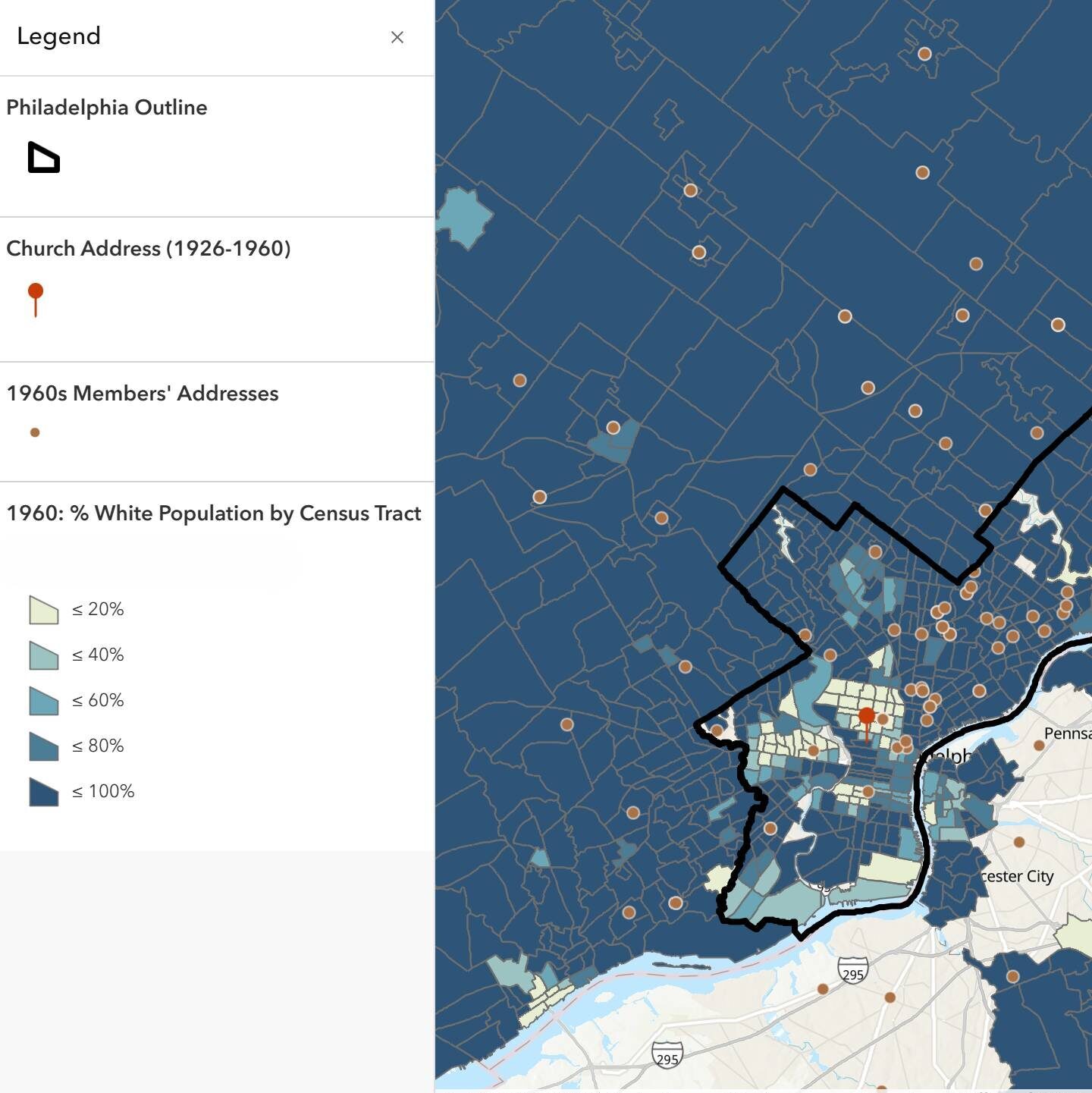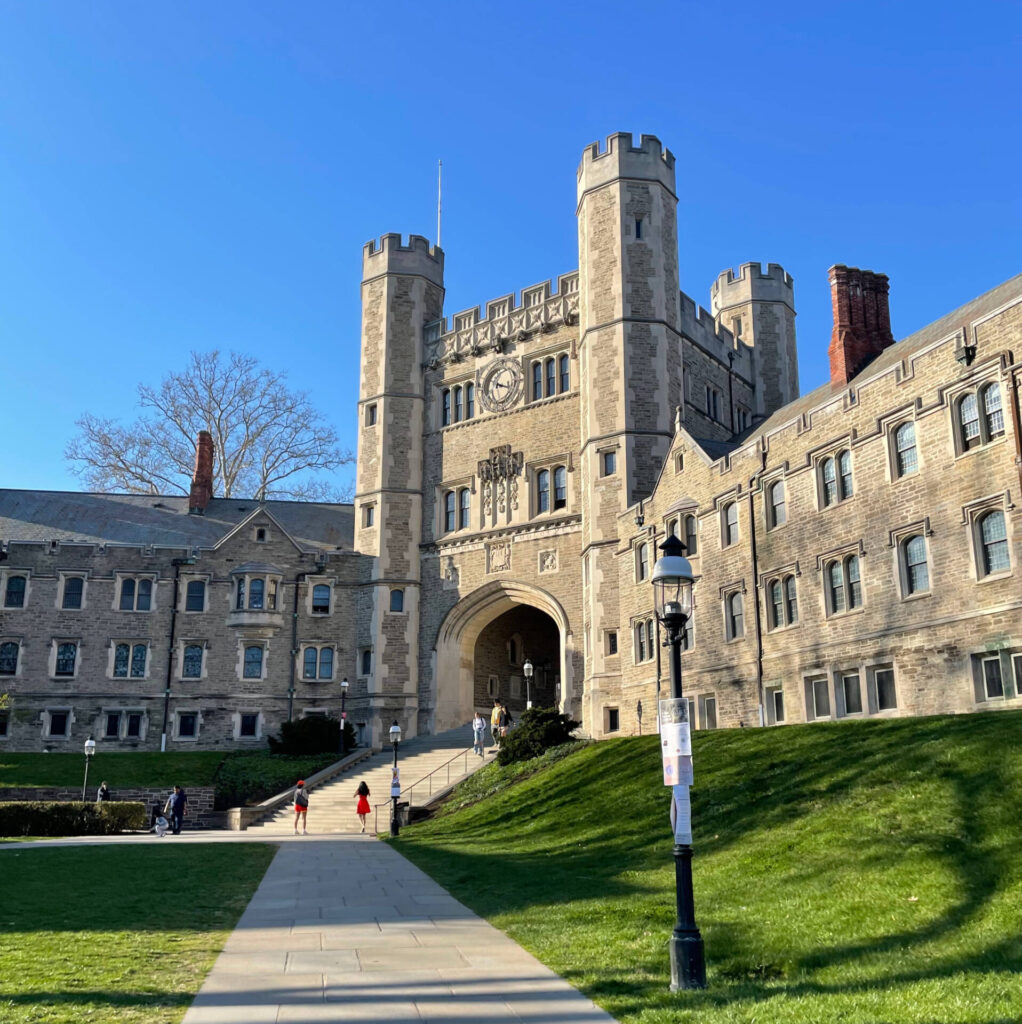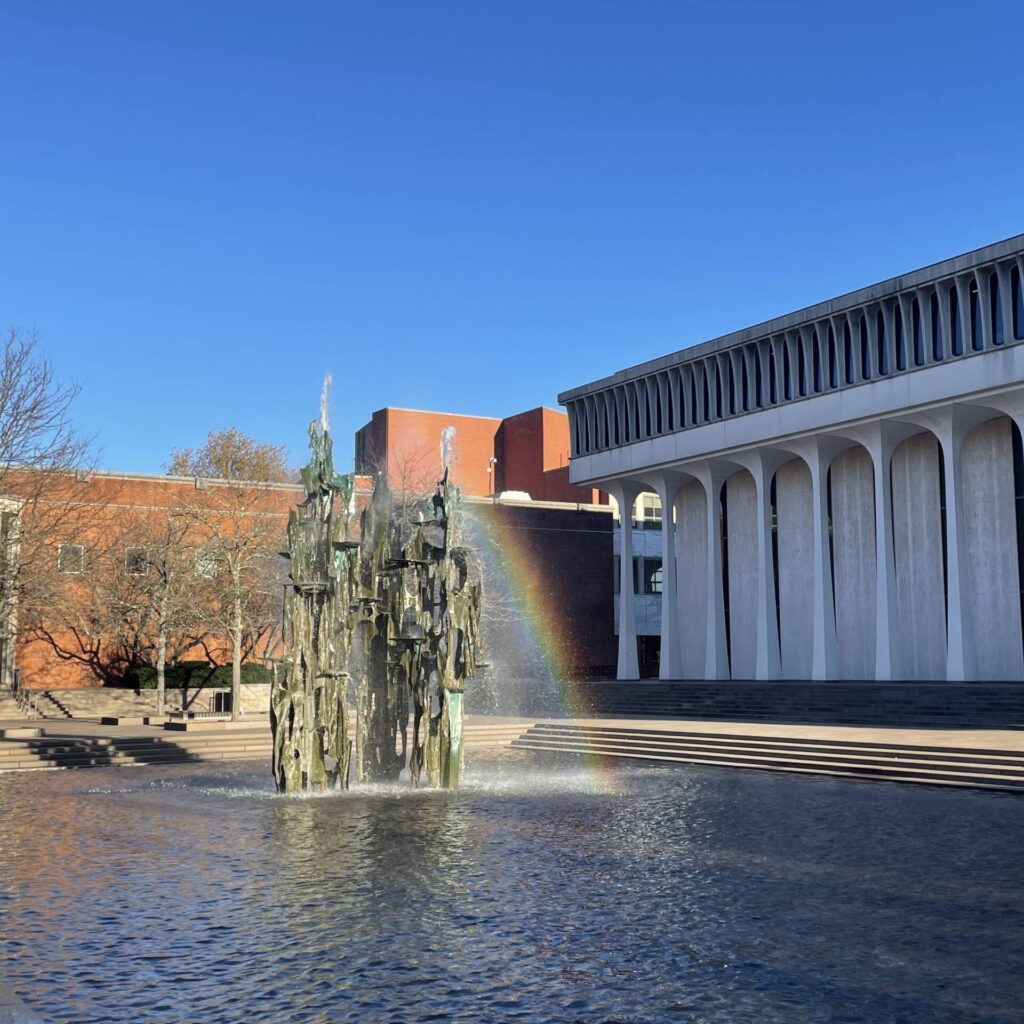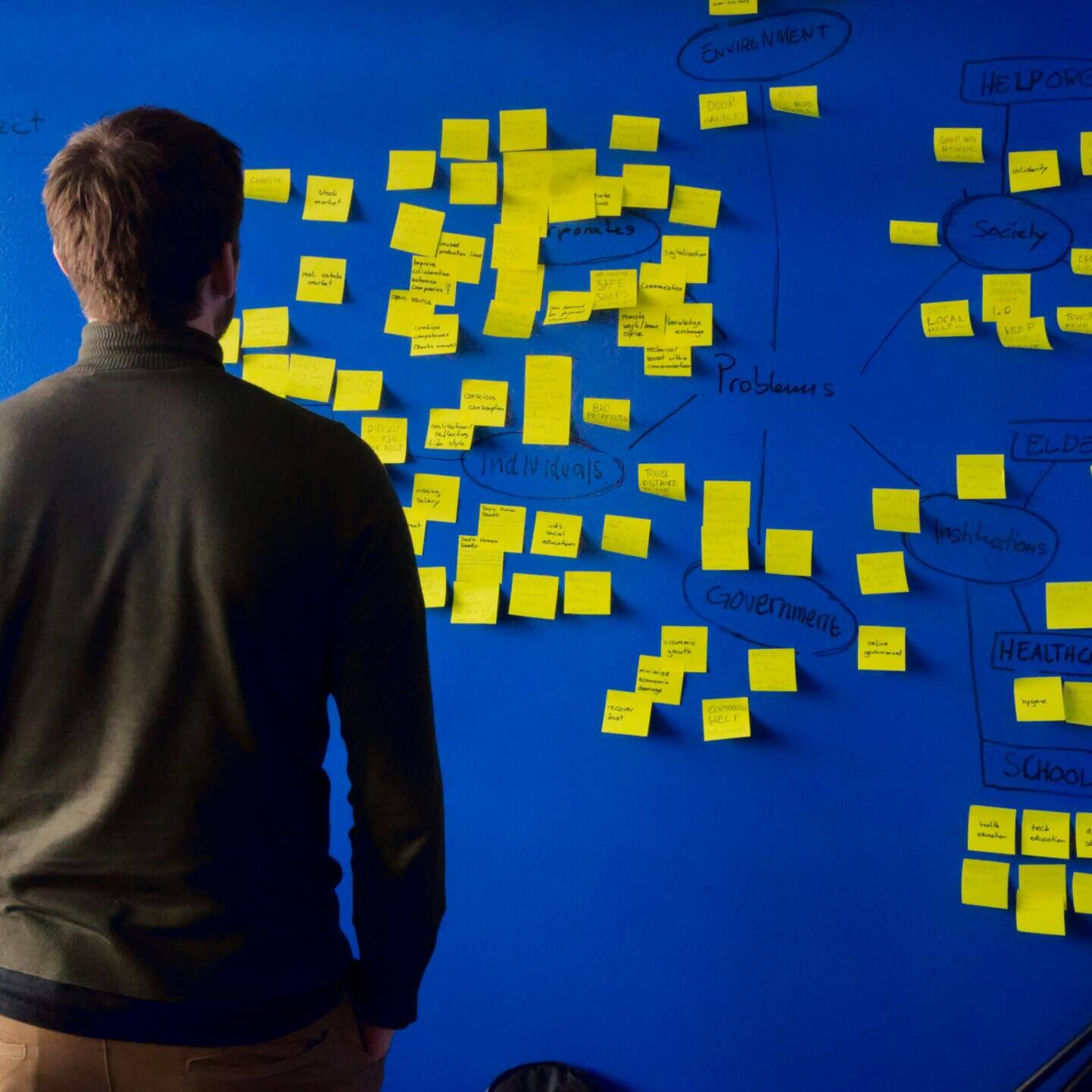As another semester draws to a close and winter break looms, now is the perfect time to make a plan for independent work over break. The flexibility of break can give you the freedom to work on your own schedule, but it can also be challenging to keep making progress without the external structure of the semester. Here are a few things that I’m doing before leaving campus to help set me up for thesis writing over the break:
Continue reading 6 Tips to Prepare for Independent Work Over BreakDigital Mapping in the Humanities and Social Sciences

In my junior paper, I explored how the racial demographics of a Philadelphia church transformed from exclusively White to predominantly Black within a few short years. I started this project in the archive, looking for any documents that could point to when and how the church’s congregation began to transform. In minutes recorded of church meetings, I identified a period of white flight, where the neighborhood around the church became increasingly non-White, and, in response, many of the church’s White members relocated to the suburbs. I knew that I could describe this congregational migration in a written narrative, but I also wanted my readers to be able to visualize it, so I turned to digital mapping.
Continue reading Digital Mapping in the Humanities and Social SciencesThe Role of Struggle in Research
Aristotle’s Metaphysics begin with an oft-quoted adage: πάντες ἄνθρωποι τοῦ εἰδέναι ὀρέγονται φύσει (Aristotle, Metaphysics A.1 980a). “All humans, by their nature, strive to understand.”
With some spare time over fall break, I decided to brush up on my Greek philosophy. My upcoming junior independent work will focus on Lucretius’ philosophical poem De Rerum Natura, and he engages with so many ideas from ancient Greek thinkers – Epicurus, Democritus, Plato, and Aristotle, to name a few – I thought it prudent to be familiar with them. Given that the very purpose of their works is to explain their ideas, I didn’t expect to run into serious trouble as I began reading them. Instead, as I started making my way through Aristotle’s Metaphysics and Plato’s Timaeus, I found myself entangled with ideas of identity, causation, and substance. My overwhelming reaction was… “wait, what?”
Continue reading The Role of Struggle in ResearchFinding Your Focus: 5 Tips on How to Narrow Down Your Topic
As someone in the social sciences and humanities, I had a broad idea of what I was interested in when going into my independent research. But once it came time to propose a specific topic, I was overwhelmed by how many possibilities there were. I was drawing on a massive archive of documents that dated back to the 1890s, so trying to decide on just one moment or figure to focus on made me feel like I was leaving a lot of important stories out. The best research projects are the ones that you’re genuinely excited about, but what do you do when you’re excited by a lot of different topics? Here are five tips that have helped me narrow down a broad research interest to a specific research topic.
Continue reading Finding Your Focus: 5 Tips on How to Narrow Down Your TopicThanking Your Mentors: Tips on Writing Your Research Paper Acknowledgements

When I sat down to write the acknowledgements for my senior thesis, I realized something surprising: my department’s resources on how to write a thesis or independent work paper didn’t include any advice on writing this section. In some ways, that makes sense. Most readers focus on sections like the abstract, methodology, and results, which really serve as and highlight the key contributions of the paper. But having guidance on how to write acknowledgements can go a long way in helping students thank the people who made their research possible. In this article, I’ll share a few tips for writing acknowledgements—whether you’re submitting a STEM paper to a conference or wrapping up your senior thesis.
Continue reading Thanking Your Mentors: Tips on Writing Your Research Paper AcknowledgementsPaying it Forward: A Faculty Perspective on Mentorship in Research

As someone who completed my junior independent work under Professor Walker’s guidance last semester, I’ve had the chance to witness his thoughtful mentorship firsthand. In a research culture where both the technical challenge and emotional uncertainty can feel overwhelming, I’ve come to appreciate how crucial the human side of research is—how we learn from and grow with those who guide us. With that in mind, I sat down with Professor Walker to explore how he thinks about mentorship: what it looks like, why it matters, and how he helps students, like me, find their footing in the world of research.
Continue reading Paying it Forward: A Faculty Perspective on Mentorship in ResearchHeads Up: You Might Need Study Approval from the Institutional Review Board

Independent research at Princeton offers an incredible opportunity for students to explore their academic interests and gain experience in the research world. This year, I’m working on my Senior Thesis with Professor Aleksandra Korolova, conducting an audit of Google ad delivery optimization algorithms. Specifically, I am studying whether aspects of advertisements—the image, text, links, and so on—impact the demographics of the audience to whom the advertisement is delivered.
In the fall, many people were curious about how my thesis was progressing. The truth was, for a few weeks, I hadn’t started running any experiments, since I first needed my research to be approved by the Institutional Review Board (IRB). Through this experience, I both gained insight into the IRB process and found that many students had never even heard of the IRB. In this article, I share my experience and offer advice for students who are planning to conduct independent research.
Continue reading Heads Up: You Might Need Study Approval from the Institutional Review BoardInsights and Interests: An Interview with Cevina Hwang
Hailing from Saipan and South Korea, Cevina Hwang is a junior in the Ecology & Evolutionary Biology department. With a longstanding interest in the field of dentistry, she chose to expand upon this passion through her junior work, where she will be exploring the evolution of the human jaw and teeth.
Join me below to read about Cevina’s journey in the junior work process.
Continue reading Insights and Interests: An Interview with Cevina HwangCitations, Citations, Citations: A Guide to Keeping Track of these Pesky Beasts
If I have to be completely honest, dealing with citations is my least favorite portion of the academic writing process. Ascertaining what citation style I need to use, successfully figuring out how to actually format citations in that style, and managing the hodgepodge of footnotes and endnotes are all tasks that seem, to me, cumbersome. Of course, these are necessary tasks: it is imperative that if we paraphrase, quote, or utilize in any way the work of others, we should always attribute the proper credit to them. But recognizing the importance of academic integrity doesn’t prevent us from still finding the task of dealing with citations to be a chore! If you’re in the same boat as I am, I’ll try to provide some advice and tips on dealing with citations!
Continue reading Citations, Citations, Citations: A Guide to Keeping Track of these Pesky BeastsComputer Science Independent Research: A Conversation with Anna Calveri ‘26

The senior thesis is a hallmark of the Princeton experience, giving students the opportunity to conduct original research under the mentorship of a faculty adviser. Every senior is required to write a thesis, with the exception of Computer Science majors in the Bachelor of Science in Engineering (B.S.E.) degree program. Instead, these students are required to undertake a substantial independent project, called independent work (IW), which can take the form of a traditional one-on-one project with an adviser, an IW seminar where a small group of students independently conduct projects tied to the seminar’s main theme, or an optional senior thesis.
In 2022, I interviewed Shannon Heh ’23 about her experience in an IW seminar, where she highlighted the structure and guidance the professor and course seminar. This year, I wanted to explore the perspective of a B.S.E. Computer Science student who pursued a different option: the one-on-one IW project.
Anna Calveri ’26 stood out as the perfect person to speak with, not just because of her exciting research at the Princeton Vision & Learning Lab led by Professor Jia Deng, but also because she began her project during the summer as a ReMatch+ intern and built on it during the fall semester. While many students only work on their IW within a single semester, Anna’s approach of extending her research across both the summer and fall gave her the chance to deepen her research and hit the ground running with impressive progress.
Continue reading Computer Science Independent Research: A Conversation with Anna Calveri ‘26




